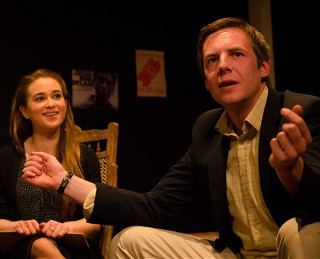A World Elsewhere (Theatre503)

The premise of A World Elsewhere, of English students, and one American Fulbright scholar, reacting to the tumults of 1968 is intriguing. Yet as Alan Franks' title (taken from Coriolanus) suggests, they’re not especially engaged with the protests against Vietnam, or radical French politics, or indeed the more straightforward union strikes closer to home. Instead the characters are more concerned with rescuing the academic career of one of their peers, suspended for stealing academic text books.
There’s a lot of period detail here: from the ornaments in student Toby’s room bedecked with posters of Hendrix and Dylan, small portable hob and kettle, knackered sofa and vinyl record player (approached by Toby only on reverent, penitential knees) – to the full vowels in the upper class accents, theatre critic jokes and the grandiloquent, fussy lectures of the dons. Dylanologists particularly will be pleased that all the records featured in the scene breaks predate the 1968 setting.
Anachronisms, if there are any, seem restricted to the attitudes of the characters. But the double-edge of Franks’ title – that the students of 1968 were, in retrospect, unimaginably privileged – seems grimly conservative to me, and only really succeeds if you can imagine a world where tuition fees won’t reverse the egalitarian trend and where princes can’t study at Cambridge without passing any entrance exams. As an exercise in nostalgia the play may succeed; but it’s less convincing as diagnostic drama.
Steffan Donnelly as Toby is extremely impressive. He moves with a kind of louche Jaggeresque felinity that belongs to the 60’s. Under pressure however, he gives way to a histrionic sense of entitlement that thankfully seems mainly a consequence of a spoilt childhood. Crispian Cartwright also relishes his role as the pompous academic Mayhew and chews his lines with plummy gravity.
Unfortunately the good performances can’t disguise the lack of assurance elsewhere. Much of this is the fault of the script, with its rather limp romantic triangle and some curious directional duff notes – there’s far more gnashing and wailing in a discussion of Nixon’s election victory than in a revelation of deep personal tragedy.
Oddly, in spite of Franks’ sympathy for his characters and for what he sees as their naïve idealism, the plot performs its own inadvertent counter argument. In blackmailing a university employee in order to force a suspended student to be reinstated, the students seem not so much to be ‘sticking it to the man’ as fighting dirty to retain the privileged positions they admit they’ve done little to earn.
When Pippa complains that ‘I see my friends picking a cause… because it’s fashionable. And I can’t bear the idea of doing something that would make me feel so suspicious of myself,’ she makes an establishment argument against personal hypocrisy that veils an aversion to any kind of conscientious action. How lovable that is, I’m really not sure.










